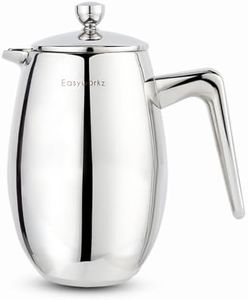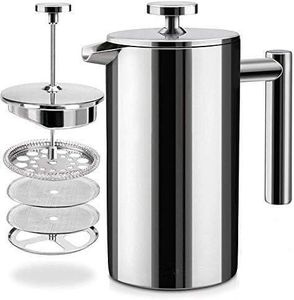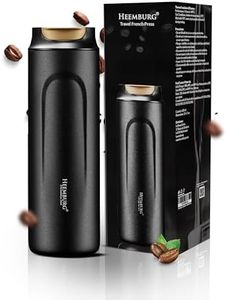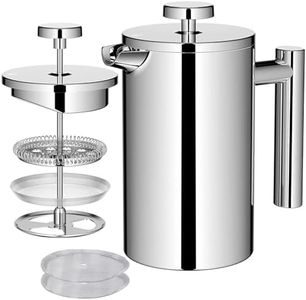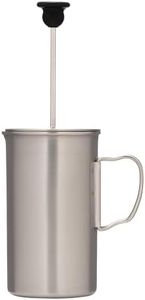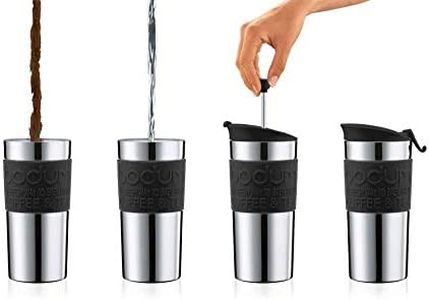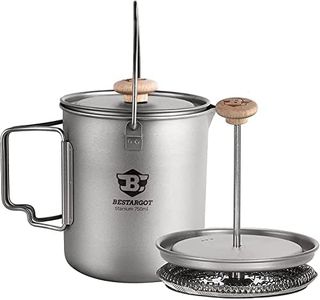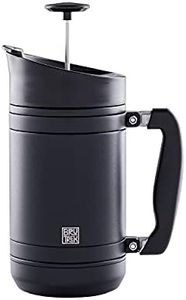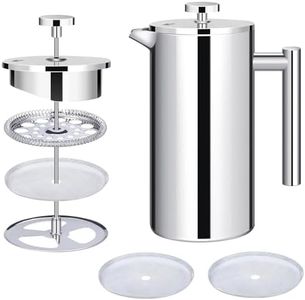We Use CookiesWe use cookies to enhance the security, performance,
functionality and for analytical and promotional activities. By continuing to browse this site you
are agreeing to our privacy policy
10 Best Camping French Press
From leading brands and best sellers available on the web.By clicking on a link to a third party's website, log data is shared with that third party.
Buying Guide for the Best Camping French Press
Choosing a camping French press is about balancing convenience, durability, and coffee quality while you’re out in nature. Since outdoor conditions can be challenging, it’s important to find a press that’s easy to use, pack, and clean, while also making sure it can handle the rough and tumble of camping trips. Think about how many people you’ll be brewing for, how much weight you’re willing to carry, and what kind of coffee experience you want while you're away from home.MaterialMaterial refers to what the French press is made from, such as plastic, stainless steel, or glass. This matters because it affects both the weight and durability of your press. Plastic is lightweight and generally shatterproof, making it great for backpackers who want to cut down on pack weight. Stainless steel is heavier but very robust, often offering double-wall insulation to keep your coffee hot longer. Glass usually produces the best-tasting coffee but is the least durable and not suited for rough environments. For most campers, choosing between plastic and stainless steel comes down to prioritizing weight versus ruggedness.
CapacityCapacity tells you how much coffee you can make in one brew. This is normally measured in ounces or milliliters. Small presses (12-16 oz) work well for solo campers who make just a cup or two at a time. Medium (20-32 oz) is good for sharing between two or three people. Larger sizes are best for groups, but keep in mind that bigger presses are bulkier and heavier. Your ideal size should match how many people you’re brewing for and how much you want to carry.
WeightWeight is simply how heavy the press is, which can make a big difference if you’re going backpacking versus car camping. Ultralight models are designed for backpackers who count every ounce, often made from plastic or thin metal. Heavier options, while more durable and sometimes better insulated, are best for situations where you don’t have to carry your gear far. If you hike long distances, opt for the lightest press possible that still meets your needs; if your campsite is near your car, a heavier and sturdier model can improve your experience.
Filter TypeThe filter in a French press separates grounds from your coffee. Most camping French presses use a metal mesh filter. Some have extra screens to reduce grit, while others use a basic single filter to save weight. Finer filters make for a smoother cup but can be harder to clean outdoors. Decide whether you prefer convenience (a coarser filter that’s easier to rinse out) or a cleaner cup of coffee, which may require more effort to maintain.
InsulationInsulation keeps your coffee hot after brewing. Some camping presses are double-walled or vacuum-insulated, while others are single-wall with no insulation. Insulated presses are especially helpful on cold mornings and if you like to sip your coffee slowly. Non-insulated models cool down quickly, but are lighter and simpler. If savoring hot coffee is important to you, prioritize insulation; if you drink your coffee right away and want the lightest option, it may not be necessary.
Ease of CleaningCleaning a French press in the wild can be tricky. Some presses have few parts and simple designs that make rinsing out grounds easy, while others have more complicated plungers or filters that trap grounds. A press that disassembles easily will help you keep things clean on the go, and can prevent bitter-tasting residues in future brews. If you’ll be on extended trips or have limited water, simpler is usually better.


